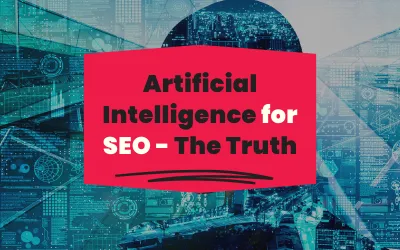 Add My Company
Add My Company
Artificial Intelligence for SEO

Search engine marketing is one of the tools that provides the highest return on your investment. But creating content is time consuming and can be expensive. In the past year or so, many companies have turned to artificial intelligence for SEO purposes. However, some have seen their rankings drop immediately after Google’s recent Useful Content update. Below you’ll find some information on how to use artificial intelligence search engine optimisation for your benefit without being dropped by Google.
Will SEO Be Taken Over by AI?
I have been speaking to a couple of copywriters recently, who have complained that they have received much fewer enquiries because “everyone’s using AI for SEO”. While this might be the case right now, businesses who have recently noticed their rankings on Google drop will be forced to pay for human input. And there might even be a shortage of copywriters who can write useful, well researched search engine optimised content.
How to Write SEO Content with AI?
Artificial intelligence is a tool, but it should be used with caution. It can create a great outline and structure, but you’ve got to remember that it only goes back in time and checks what’s already been published by others. This means that it really only recycles content.
It’s important to note here that AI doesn’t have emotional intelligence, nor does it have original ideas.
To write SEO content with AI, you’ll need to supervise the tool you are using. You will also have to learn giving it clear intentions. It’s always better to train the AI tool to match the target reader’s preferences. If this is not possible, you will need to edit the content, and I mean edit it heavily. Then, you will need to put it through readability and AI checks to ensure it complies with Google’s “useful content” principles.
Can AI Content Rank on Google?
It is possible to rank AI content on Google, but not in its original form. And if you don’t change the content manually, you might not rank for long.
The aim of Google’s useful content principle is to “present helpful, reliable information that’s primarily created to benefit people, not to gain search engine rankings, in the top Search results”. (Developers.google.com)
As such, Google provides us with a number of content quality questions that help businesses and marketers whether their use of artificial intelligence for SEO complies with the guidelines.
Here’s a list of the most important E-A-T Principles.

How to Optimise AI Content
As it’s been mentioned, it’s almost impossible to write SEO friendly content with AI, unless you review and edit the information produced by the bot. However, with these simple steps you will be able to utilise artificial intelligence for research, and still produce search engine friendly content faster.
The main goal of content marketing is to engage with your audience, create interest, and position yourself as an expert in your field. AI content is not going to cut it. Therefore, you’ll need your own voice, your insights, and a couple of personal examples to make people engage with you. As I always say; your customers want to be in a relationship with you!
Once you’ve got an outline for your content, make sure that you read it out loud. Correct anything that does not sound human or is not easy to understand. Next, you’ll have to change some words, add a better structure and style to the content. Finally, add your personal experiences and examples that are unique to you, as well as a strong, relevant call-to action.
Does Google Penalise AI Content?
The simple answer is that Google does not penalise AI content. But it does penalise poorly written and poorly researched content. Therefore, if you “CBA” editing what your AI bot wrote, you might end up in trouble with the search engine giant.
A recent experiment from one of our clients confirms that you absolutely need to “supervise” artificial intelligence when creating SEO content. We went ahead and changed two product description pages and waited for the next weekly update on the rankings. One of them was purely AI SEO content, while the other one was produced by an experienced copywriter. The content score on the AI product description went down, and the rankings plummeted. The content score on the human-written content went up and we gained several ranking positions.
The Dangers of Overusing AI Tools
If you keep on using too much AI in your writing, be it blog posts, product descriptions, or social media content, you will end up losing your unique voice. Consequently, you will lose the personal connection with your audience. Personal branding is crucial in professional services, and you will have to aim for tailoring all content to the preferences of your target customers. AI cannot (yet) do that. Nor can it understand readers’ intent and your aim for the writing.
The Truth about Software to Use Artificial Intelligence for SEO
We at LMNts Marketing encourage the use of artificial intelligence for SEO purposes, but only in moderation. It’s great to give you a good outline for a presentation, even a blog post. But you’ll need to rewrite the text to make it sound authentic.
Artificial intelligence tools are also great for automating tasks, and giving your content a structure. In fact, you can train some AI tools to learn from your language. But the development of this technology is slow, and you can do more harm than good. Regenerative features are in their infancy.
SEO is more about understanding trends than coming up with keywords and randomly putting them into the content. So, in essence, AI is good for starting an SEO project, but not good from start to finish. An SEO marketing agency will have the expertise to use the tools in a productive but also creative way.
Which AI Tool Is Good for SEO?
- Standard ChatGTP is great for SEO, as long as you teach it some important commands, including the length of the titles, etc. There’s a lot of tools that are based on ChatGTP algorithms, and they vary based on the quality of the content output.
- ChatGTP uses Bing’s results which are – mainly – more reliable than Google’s. You can also use this basic tool to create third party apps.
- Claude is a more innovative tool which gives you more context window and better analysing and summarising abilities.
- Google’s own Gemini allows you to integrate the tool into your Google Docs and even YouTube.
- Pi (Inflection-1) is great for users who are looking for more personalisation and a small level of emotional intelligence.
- Poe is one of the best generative AI, developed and used by Quora, a site with user generated questions and answers which are fed to the bot.
We love working with Merlin, which provides us with different user voices and actually understands the target audience and intent. However, we mainly use this tool for idea creation and developing social media concepts. It’s also great for checking the main players in each industry, and identifying influencers to follow and analyse.
Not to mention that ChatGTP only speaks American English!
The Full Guide to Artificial Intelligence Search Engine Optimisation
For this part, we’ve utilised Merlin and asked it to give us a list of to-dos and not-to-dos. I’m impressed with how well it did, to be honest. Here’s a screenshot of what Merlin said:

As you can see, the content created by Merlin has a few good points. However, it has not fully grasped my intent. For example, mobile optimisation is not really relevant to AI, is it? And while Merlin is telling us to create high-quality content, it doesn’t give us an actionable guide.
Now, to go to the good points: I don’t think many people knew about AI’s use for link building, which – indeed is a great tool. I also like the fact that AI told us to “optimise natural language processing”, almost saying that – it’s our job not theirs.
And surprise-surprise , it comes to the egoism of AI: it’s actually telling us not to ignore AI content generation… of course! However, it’s just not giving us enough reason why we should!
Here comes our (human) rewritten version of how to use artificial intelligence for SEO:

To do:
- Focus on the user experience and user intent first
- Aim for a certain readability score
- Check the sources and check them again
- Use AI to create a content structure based on the purpose of the content
- Add your own twist to it
- Use AI to find relevant sites to collaborate with for your link building strategy
Don’t do:
- Copy and paste AI generated content into your blog or website.
- Ignore the reader
- Keep the information general; for a sales copy to convert, it’s got to be highly specific and relevant.
- Use AI to cheat on copywriting.
- Ignore the power of hand crafted original illustrations.
- Link to sites as sources, just because AI told you to!
Conclusion
From the above overview, you can see that AI is great for starting an SEO project, but it is not intelligent enough to fully grasp the question and stay on topic. It’s your job to weed through the information gathered by bots to see which ones are relevant. It’s also your job (or your marketing agency’s) to humanise content and tailor the language to the needs of the reader. AI doesn’t know (or care) about psychology, so it will just remain what it is: a tool that can make marketers who use it wisely more productive.
Resources:
https://developers.google.com/search/docs/fundamentals/creating-helpful-content
https://developers.google.com/search/blog/2022/12/google-raters-guidelines-e-e-a-t
https://neilpatel.com/blog/ai-seo/
https://www.searchenginejournal.com/scalable-ai-tools-for-seo-a-quick-guide-for-2024/504495/
For more information on Artificial Intelligence for SEO talk to LMNts Marketing
